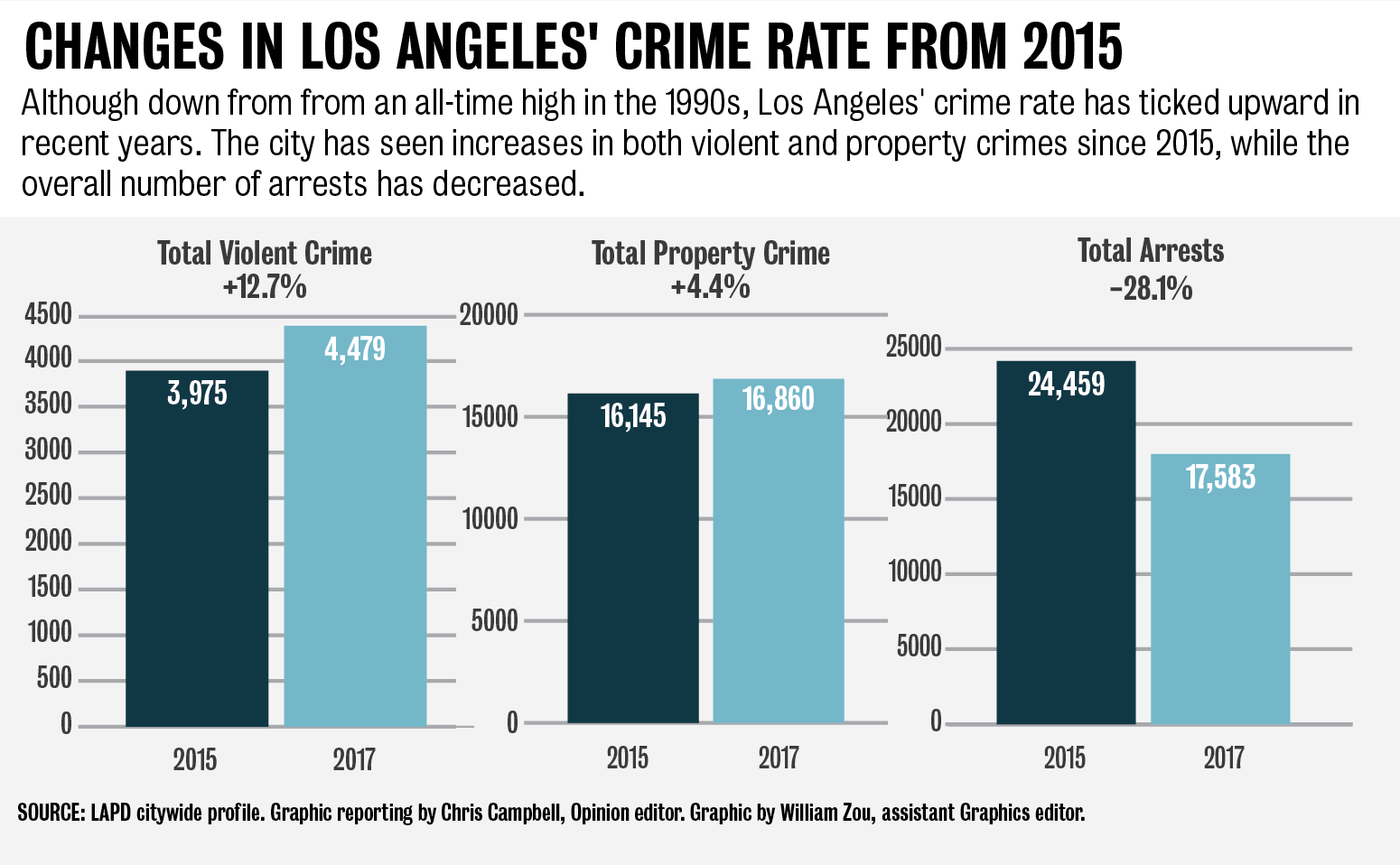William Zou: The solution to crime lies in communication, not incarceration

By William Zou
March 9, 2017 10:27 p.m.
Henry Olivera grew up in a labyrinth of violence, gangs and incarceration.
Olivera was raised in Compton, a region in Los Angeles notorious for its gang-related crimes. He contended with a legion of negative influences, including pressure to join gangs, distrust of law enforcement and negligently underfunded high schools. Yet despite having overcome these obstacles, Olivera, now a fourth-year neuroscience student here at UCLA, continues to bear the scars and experiences of South Central LA.
“Shootings and gang-bangings are pretty common,” Olivera said. “Coming out here in UCLA, I sometimes feel uncomfortable. … I’m not used to walking out at night.”
And he’s not the only one. The stories of individuals living in South Central and the obstacles they face as a community mired in poverty can be easily overshadowed by a vast mountain of crime statistics. Social conservatives – and sometimes law enforcement – tout mass incarceration as the primary reason why crime has declined over the past two decades, but that does not consider the possibility that incarceration may be an altogether heavy-handed approach that keeps communities from thriving while driving crime rates up.
Incarceration is not the silver bullet for addressing crime. The Los Angeles Police Department must communicate and engage itself regularly with crime-riddled communities to address the underlying tensions that lead to incidences of serious lawbreaking.
Violent crime over the past two decades has certainly seen a dramatic decrease – as much as our tangerine commander in chief may disagree. While this descent in violence is a promising signifier of a more lawful society, the dark stain of incarceration persists. After all, as of 2012, over 2 million individuals in the United States languished behind bars.
Incarceration does not tackle the roots of the problem of violence; rather it deals with its symptoms. Imprisonment doesn’t just impact the lawbreakers, but also their families and communities. Olivera’s own brother fell into the trap of the three-strikes law – in which people who have committed felonies with two prior convictions are handed sentences of 25 years to life – and is now in prison. Olivera can personally attest to how family members can undergo trauma of separation and how the financial stress on households can drive youths to join gangs in pursuit of “easy money.”
“You see kids in middle school with tattoos, dressed in full gang clothing,” Olivera said. “Theres a lot of reward you get from joining. … Being in a gang gives you power, it gives you respect, it gives you friends.”
California voters recognized this. In 2014, voters passed a proposition to reduce the labels of drug and property crimes from felonies to misdemeanors. Even the infamous three-strikes law was amended in 2012, granting prisoners the possibility of parole. However, the sentiment of incarceration as the end-all-be-all solution to crime has persisted in law enforcement.
2015 and 2016 saw the highest rates of crime in LA since 2009, and law enforcement officers were quick to pin the blame on the softening of previous laws. Most recently, the murder of Whittier Police Department Officer Keith Boyer by an alleged gang member prompted Whittier Police Chief Jeff Piper to criticize the relaxing of the three-strikes law.
In response to the rise in crime over the past few years, LAPD doubled the size of its Metropolitan Division to focus more on South Central. But 2016 was still the second straight year with an increase in crime – robberies and aggravated assaults went up by about 17 percent and 19 percent, respectively.
“Militarizing the police isn’t going to help,” Olivera said. “Making changes in schools is going to help. Making changes in the police and having them talk to us and not just arrest us and not just kill us. That’s going to help.”
Olivera is right. Communication is an underutilized tool in defrosting tensions. The LAPD needs to explore alternatives beyond arresting citizens and dumping them in prison in order to curb crime. It needs to focus on improving communication with afflicted neighborhoods and attacking the bad blood with law enforcement that contributes to the persistent of violent crime.
Similar efforts have worked in other cities. Cure Violence, a nongovernmental organization based in Chicago, deals with violence by sending its trained officers in during heated situations – after shootings or murders – to work with victims and calm everyone down. The organization also seeks out high-risk individuals to teach them about the consequences of violence. This method is proven to be quite effective. Neighborhoods where the organization put their efforts in saw a major decrease in shootings and retaliations.
Certainly, personal accountability plays a huge role in the rise in crime. However, crime is more than a statistic; it is a symptom of a deeply flawed society. When society fails to defend those who are most vulnerable, when it allows inner-city schools to crumble under an avalanche of budget cuts and when it does not provide youths the opportunity to live a life beyond poverty and under-education, it must be held responsible for the crime that serves as inevitable consequences.
The solution to crime lies within true communication between officers and communities, be that for bettering relations or helping children realize their potential despite the crime-ridden environments they may be in.
Olivera now tutors elementary school children in South Central as executive director of his self-founded Watts Tutorial Program.
“It might be impossible for all of them to get straight As,” said Olivera. “But if you could just spark that little fuse and get them motivated to do something with their lives. … I hope that it will break the cycle of them being there.”
As Los Angeles finds a path forward in the 21st century, it must prioritize a just and equitable society, and that means giving its most vulnerable citizens opportunity – not a jail cell.


